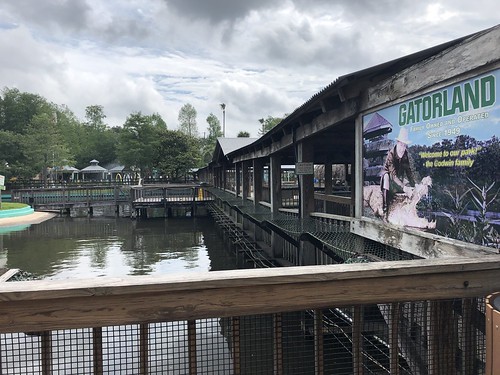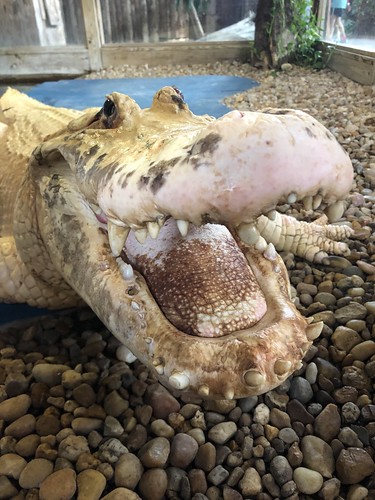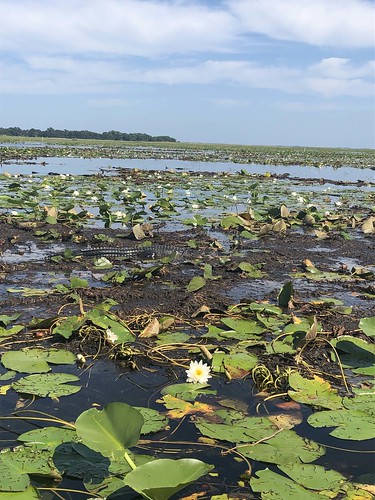5 Family-Friendly Eco Destinations in Kissimmee, Florida
Chances are if you’ve visited Orlando, Florida, home to theme park behemoths Walt Disney World, Universal Studios Florida and others, you’ve also been to Kissimmee, its sister city just to the south. The two cities meld into one another – and yet for families looking to break up their days in the theme parks with some natural sites you can only find in Central Florida, Kissimmee offers the the perfect starting point.
Here are a few places in and around Kissimmee to add into your family’s itinerary on your next visit to the area.

See some of the rarest alligators in the world at Gatorland
The oldest theme park in central Florida belongs not to a big-eared mouse name Mickey, but instead to a gathering place for around 2,500 alligators and crocodiles. Now in its 70th year, Gatorland, which happens to be just fifteen minutes due east of Walt Disney World, has been educating visitors about the leathery reptiles since 1949.


Gators are divided up by size and age into different areas within the 110-acre property. Besides the gators, there are exhibits dedicated to panthers, emus, snakes and tortoises, too. One of the tortoises, a gentle giant called Dean, is well over 100 years old!

Giant Turtle
But, of course, the real stars in Gatorland are the gators. Some of the largest on the property (and most intimidating, if you ask me) include the 13-foot, 7-inch Chester, who was brought to Gatorland after being found in a Tampa Bay neighborhood where he’d been staying fed by tracking down local dogs. Gatorland guides will tell you that when an alligator grips something in its jaws, pound-for-pound it has the same force as the crusher at a junkyard – yes the ones that tear cars in half. And Chester is more than happy to demonstrate his powerful jaws.
The rarest find, however, in Gatorland, is brothers Ferris Zombi and Trezo Je. The pair are two of twelve leucistic alligators in existence. At first, you might think Ferris and Trezo are albino alligators because of their white color–and there are albino alligators on the property. Leucistic alligators occur based on a rare genetic mutation where the gators lack pigmentation–and they typically have blue eyes.

Leucistic gator
For a bird’s eye view of Gatorland, you can opt to go on a single-ride zip line right over the gator’s breeding marsh or go on a 2 1/2-hour zip line tour. One note: the single-ride zip is wheelchair accessible.
Cycle through Walt Disney’s version of a utopian neighborhood
Winding your way through Disney’s planned community, Celebration, feels a bit like you’ve entered the set for the old 1950s Leave It to Beaver TV show, or more recently the Jim Carrey-led film about an idyllic community with an eerie twist in The Truman Show. In the early 1990s, work began on the community, which was built to honor Disney’s vision of a futuristic, yet homey community. Bike rentals are available through Celebration Bike Rental near the Bohemian Hotel. You can take the bike out on your own or enlist a guide to show you around town. Our guide, a long-time resident, relayed the history of the the planned community of 4,000 homes while we rode.
The tour delved into little details you might miss on your own, including one section of houses that are required to have white-picket fences, but no two houses can have the same design; or the fact that palm trees were verboten within the community (apparently, they lacked the more old-school neighborhood feel the community sought to emulate); or what about the Architectural Review Committee, or ARC, that comes on a regular basis to ensure properties adhere to the strict and allowable designs (not to be confused with the Landscape Review Committee that double checks that all the yards are neat and tidy)?

Cycling at Celebration
Cycling through feels a bit like you’ve stepped right into a veneered slice of Americana that seems almost too good to be true–and perhaps that’s how Disney intended it, an ideal to aspire to.
Soar through the clouds in a hot air balloon
You’ll have the coax yourself out of bed to make it to the Orlando Balloon Rides offices around 5 a.m. – but getting up before the sun gets up is worth the view once you start rising above neighborhoods and fields. I’ve only been on a balloon ride once before in my teens, and recalled the ride being noisy and jarring with the pilot regularly feeding the balloon’s hot air with the burner’s flames.

Not so with this ride – the 16-person balloon basket seemed to lend to a smoother ride and once we rose into the air the burners were silenced and everything stilled. At first, I was concerned that the cramped quarters in the basket might detract from the experience, but I was grateful to have people around me to share my fears that occasionally mixed in with my fascination of watching the sites beneath us.

Go on an airboat ride in Boggy Creek
Skimming Lake Tohopekaliga, the airboat captain scanned the water’s surface for any glints of movement. Stops were frequent as he spotted more than one three-foot gator lying low in the water, trying to stay hidden, while still staying in the sunlight.

Spotting gators at Boggy Creek
Airboat rides are just one of the offerings at the Boggy Creek Airboat Adventures complex. Besides a gator pond full of sunning reptiles, there’s also a gem mine and a Native American Village. The village includes replicas of various Indian structures meant to explain to visitors about the tribe who once inhabited the area, the Jororo Tribe.

Native Village
The Big Mountain Family gives regular presentations on how the Indians lived. Our guide Theresa explained that her mother’s family were Mohawk Indians and her father’s side was Comanche, and she felt privileged to teach visitors the ways of the Indians that called Lake Tohopekaliga home so she could preserve their memory. She walked us through the ingenuity of the native peoples who adapted to living next to a swamp by building their living spaces with floors off the ground–it helped with ventilation to keep cool and had the added benefit of staying dry in case of flooding waters. They’d sleep at night in hammocks–both the adults and the children. Theresa explained that parents would tie a string from their child’s hammock to their toe so they could rock the kids at night if they woke up. The Indians who lived there were a matriarchical society, Theresa explained, in her words, “The clan mothers were the mothers of the tribe.” And when a man married, he moved into his wife’s tribe, not vice versa.

Instruction at the Native Village
You could easily spend the better part of a day at Boggy Creek between the airboat ride and meandering through the various offerings. One side note: there’s an eatery on property serving up barbecue, like beef brisket and pulled pork, along with gator bites (and yes, gator tastes like chicken).
Kayak with gators in a cypress forest
By far my favorite outdoor activity in the Kissimmee area was kayaking Shingle Creek. Right off one of the main highways, Shingle Creek looks fairly indistinct as you drive up to The Paddling Center. After being outfitted with a life vest and given a lesson in proper paddling (which I appreciated since I love to kayak, but my skills are still sub par at best), we headed out onto Shingle Creek. The northernmost edge of the Everglades, Shingle Creek is canopied with cypress trees, and became a Florida Designated Paddling Trail in 2015.

The Paddling Center
Our guide, Alex Friedrich, explained the history of the area, along with pointing out the vegetation and wildlife as we paddled. It wasn’t long into our two-hour trip before Alex spotted baby alligators scooting through the shoreline waters. While I can’t speak for others in our kayaking group, I was startled to see gators–even small ones–so close to my kayak (especially given my limited padding skills). Alex, who studied wildlife conservation and herpetology (the study of reptiles) in college, explained that gators are more afraid of humans than we are of them.

Kayaking Shingle Creek
“Alligators, especially wild alligators, are not something you need to be afraid of,” assured Alex. “We actually joke – we call them ‘swamp kittens.’” He went on to explain that gators are naturally timid, something I observed when we later encountered the baby gator’s momma farther down the creek. We eased our kayaks by her as she watched, then slid into hiding. And I found myself more fascinated than fearful as I clumsily worked my kayak past her.
Alex remarked more than once that we were only minutes from some of the largest theme parks in the world – and yet most visitors probably had no idea of the nearby creek.

Kayaking Shingle Creek

Cypress Trees at Shingle Creek
While Kissimmee certainly has plenty to offer families as a gateway to many of the world’s well-known theme parks, it also holds many natural wonders, too, that are worth taking time to explore.
Kristen J. Gough is the Global Cuisines and Kids Editor for Wandering Educators
All photos courtesy and copyright Kristen J. Gough



















